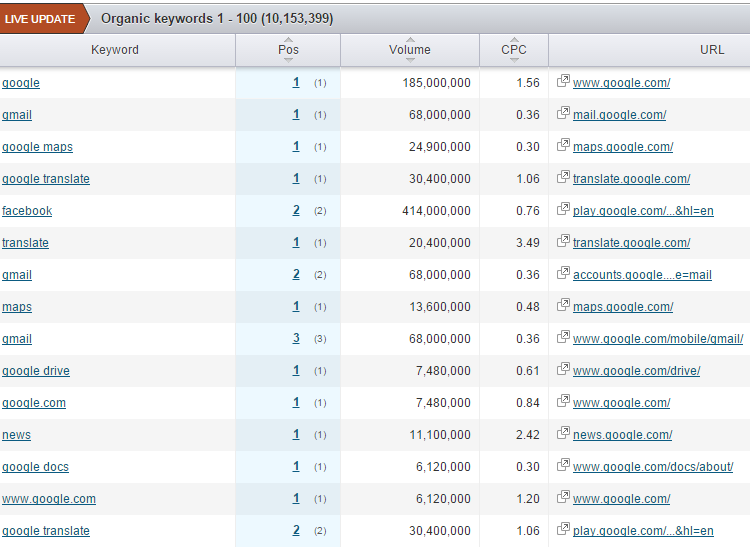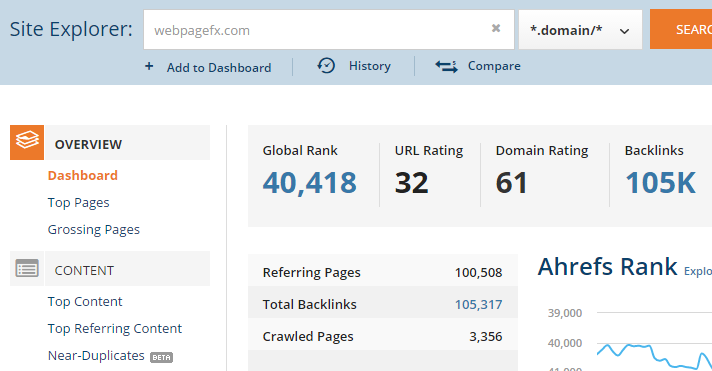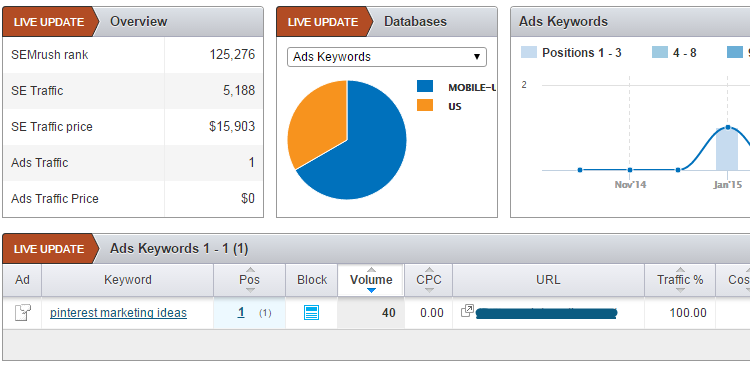-
 5 min. read
5 min. read
-
 Trevin Shirey
Trevin Shirey VP of Marketing
VP of Marketing
- Trevin serves as the VP of Marketing at WebFX. He has worked on over 450 marketing campaigns and has been building websites for over 25 years. His work has been featured by Search Engine Land, USA Today, Fast Company and Inc.
If you have any hands-on experience with SEO, you know that a lot goes into optimizing a site to perform well in search engines. From keyword research to link building strategies, there’s a lot to be done if you want to rank well. Unfortunately, your site isn’t the only one you need to worry about.
There are millions of other businesses competing for consumers’ attention online, and at least a handful of them provide the same products or services as you. This means that if you want to attract customers online, you need to keep tabs on who you’re up against. Thankfully, competitive analysis isn’t just a defensive move – it can also provide new opportunities for your own site.
But if you’re not convinced that it’s worth it, here’s why you should keep an eye on your company’s top competitors:
Keyword ideas
When you first created your SEO strategy, you or your agency more than likely performed a competitive analysis as part of your keyword selection process. But even so, this is a process you should repeat at least once or twice a year.
If a company sells products or offers services that are similar to yours, there’s definitely going to be some overlap in the keywords you optimize for. However, the biggest advantage of keyword analysis isn’t just identifying who else is competing for the same phrases – it’s finding keywords you hadn’t even thought of. With tools like SpyFu and SEMrush, it’s easy to identify the top-performing pages on your competitors’ sites, whether they’re landing pages, product pages, or posts in an article or blog section.
For example, if you wanted to see what keywords Google ranked for, you could type “google.com” into SEMrush’s search bar:  This shows you all of the keywords that a particular site ranks for, their position in the results, the number of searches over the past 12 months for each term, and the share of traffic that term delivered to them, among many other pieces of information. And although your competitors hopefully don’t rank for over 10 million different keywords like Google, you should be able to see what they’re targeting so you can compete. Spend some time combing through these pages and create a spreadsheet of potential keyword ideas.
This shows you all of the keywords that a particular site ranks for, their position in the results, the number of searches over the past 12 months for each term, and the share of traffic that term delivered to them, among many other pieces of information. And although your competitors hopefully don’t rank for over 10 million different keywords like Google, you should be able to see what they’re targeting so you can compete. Spend some time combing through these pages and create a spreadsheet of potential keyword ideas.
Although not all of them will be directly relevant to your brand, this can be a great way to identify gaps in your own strategy. As an added bonus, this type of research often leads to new topics for your own blog posts or article pages. And while I’d never recommend that you blatantly steal content, taking a new angle to an already popular subject can be a solid starting point.
Link opportunities
In addition to the content on your competitors’ sites, you should also take an in-depth look at the off-page signals that play a role in their rankings. Tools like Moz’s Open Site Explorer and Ahrefs Site Explorer make this simple. Just type a competitors’ URL into the search bar, and you’ll be able to find everything you need to know about the quantity and quality of their backlinks:  You can see who is linking to them and what links go to different pages.
You can see who is linking to them and what links go to different pages.
Much like keyword research, this will help you identify their top-performing pages. When you take a look at your competitors’ backlinks, you not only get insight into their online authority, but you can also identify potential link building opportunities. There’s a strong chance that if a site already linked to one of your competitors, they’ll be open to the possibility of linking to you, too.
That being said, the most successful link building strategies today revolve around creating quality content. Take a look at what exactly it is that’s earning your competitors links (whether that’s infographics, news articles, blog posts, or something else), and consider adding that into your own strategy.
Organic rankings
Although rankings fluctuate, it’s still a good idea to keep an eye on where your site stands in relation to your competitors.
Although there are tools you can use for this if you’d like, a simple Google search for a few of your top keywords is all you really need. Take note of who else is ranking on the first page, and be sure to include them when you do keyword and link analysis. And if you notice that a particular site is climbing the rankings, it could be worth a few minutes of your time to check out their site and see what strategies they’re using.
Paid ads
Up until this point, I’ve only mentioned research that relates to organic rankings. However, if you run any sort of paid ad campaigns, you should monitor your competitors’ efforts there as well. There are few different tools you can use for this, but I prefer to use SEMrush.
Just type in one of your competitors’ URLs, select the “Advertising Research” tab, and you’ll be able to see their ad text, average position, and percentage of total budget and traffic for each keyword.  This will help you determine new keywords to target, as well as how much you should expect to spend.
This will help you determine new keywords to target, as well as how much you should expect to spend.
Do you know where your competitors stand?
If you’ve never taken the time to research your competitors’ keywords, backlinks, and paid ad strategies, it’s time to get started.
Keeping tabs on someone else’s marketing efforts in addition to your own might sound like a lot of extra work, but considering that it can help you identify new opportunities, outrank your competitors, and compete in your industry, it’s definitely worth the time. Do you have any questions about competitor analysis? Do you use any tools that I didn’t mention here?
Let me know in the comments below!
-
 Trevin serves as the VP of Marketing at WebFX. He has worked on over 450 marketing campaigns and has been building websites for over 25 years. His work has been featured by Search Engine Land, USA Today, Fast Company and Inc.
Trevin serves as the VP of Marketing at WebFX. He has worked on over 450 marketing campaigns and has been building websites for over 25 years. His work has been featured by Search Engine Land, USA Today, Fast Company and Inc. -

WebFX is a full-service marketing agency with 1,100+ client reviews and a 4.9-star rating on Clutch! Find out how our expert team and revenue-accelerating tech can drive results for you! Learn more
Try our free Marketing Calculator
Craft a tailored online marketing strategy! Utilize our free Internet marketing calculator for a custom plan based on your location, reach, timeframe, and budget.
Plan Your Marketing Budget

Looking for More?
Get expert ideas, industry updates, case studies, and more straight to your inbox to help you level up and get ahead.
"*" indicates required fields
Try our free Marketing Calculator
Craft a tailored online marketing strategy! Utilize our free Internet marketing calculator for a custom plan based on your location, reach, timeframe, and budget.
Plan Your Marketing Budget





